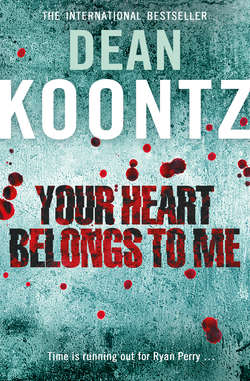Читать книгу Your Heart Belongs to Me - Dean Koontz - Страница 11
ОглавлениеFIVE
Ryan’s internist had a concierge practice limited to three hundred patients. He guaranteed an appointment within one day of a request, but he saw Ryan only three hours after receiving his call.
From an examination room on the fourteenth floor, Ryan could see Newport Harbor, the Pacific Ocean, distant ships bound for unknown shores.
His doctor, Forest Stafford, had already examined him, and a med tech had administered an electrocardiogram. Then Ryan had gone down to a medical imaging company on the third floor, where they had conducted an echocardiogram.
At the fourteenth-floor window, he waited now for Dr. Stafford to return with an interpretation of the tests.
An armada of large white clouds sailed slowly north, but their shadows were iron-black upon the sea, pressing the surf flat.
The door opened behind Ryan. Feeling as weightless as a cloud, and half afraid that in an angled light he would cast no shadow, he turned away from the window.
Forest Stafford’s powerful square body was in contrast to his rectangular countenance, in which his features were elongated, as if affected by a face-specific gravity that had not distorted the rest of him. Because he was a sensitive man, the deforming force, at work for years, might have been the pain of his patients.
Leaning against the counter that contained the hand sink, the physician said, “I imagine you want me to cut to the chase.”
Ryan made no move to a chair, but stood with his back to the window and to the sea that he loved. “You know me, Forry.”
“It wasn’t a heart attack.”
“Nothing that simple,” Ryan guessed.
“Your heart is hypertrophic. Enlarged.”
Ryan at once argued his case, as if Forry were a judge who, properly persuaded, could declare him healthy. “But … I’ve always kept fit, eaten right.”
“A vitamin B1 deficiency can sometimes be involved, but in your case I doubt this is related to diet or exercise.”
“Then what?”
“Could be a congenital condition only now expressing itself. Or excessive alcohol consumption, but that’s not you.”
The room had not suddenly gone cold, nor had the temperature plunged in the day beyond the window. Nevertheless, a set of chills rose at the back of Ryan’s neck and broke along the shoals of his spine.
The physician counted off possible causes: “Scarring of the endocardium, amyloidosis, poisoning, abnormal cell metabolism—”
“Poisoning? Who would want to poison me?”
“No one. It’s not poisoning. But to get an accurate diagnosis, I want you to have a myocardial biopsy.”
“That doesn’t sound like fun.”
“It’s uncomfortable but not painful. I’ve spoken with Samar Gupta, an excellent cardiologist. He can see you for a preliminary exam this afternoon—and perform the biopsy in the morning.”
“That doesn’t give me much time to think,” Ryan said.
“What is there to think about?”
“Life … death … I don’t know.”
“We can’t decide on treatment without a definitive diagnosis.”
Ryan hesitated. Then: “Is it treatable?”
“It may be,” said Forry.
“I wish you’d just said yes.”
“Believe me, Dotcom, I wish I could just say it.”
Before Forest Stafford was Ryan’s internist, they had met at a classic-car rally and had struck up a friendship. Jane Stafford, Forry’s wife, bonded to Samantha as if she were a daughter; and Dotcom had since been more widely used.
“Samantha,” Ryan whispered.
Only upon speaking her name did he realize that the preliminary diagnosis had pinned his thoughts entirely on the pivot point of this twist of fate, on just the sharp fact of his mortality.
Now his mind slipped loose of the pin. His thoughts raced.
The prospect of impending death had at first been an abstraction that inspired an icy anxiety. But when he thought of what he would lose with his life, when he considered the specific losses—Samantha, the sea, the blush of dawn, the purple twilight—anxiety quickened into dread.
Ryan said, “Don’t tell Sam.”
“Of course not.”
“Or even Jane. I know she wouldn’t mean to tell Sam. But Sam would sense something wrong, and get it out of her.”
Like wax retreating from a flame, the mournful lines of Forry Stafford’s face softened into sorrow. “When will you tell her?”
“After the biopsy. When I have all the facts.”
With a sigh, Forry said, “Some days I wish I’d gone into dentistry.”
“Tooth decay is seldom fatal.”
“Or even gingivitis.”
Forry sat down on the wheeled stool, where he usually perched to listen to a patient’s complaints and to make notes in his files.
Ryan settled into the only chair. After a while he said, “You made a decision on the ’40 Mercury convertible?”
“Yeah. Just now. I’m gonna buy it.”
“Edelbrock two-carb manifold? That right?”
“Yeah. You should hear it.”
“What’s it stand on?” Ryan asked.
“Nineteen-sixty Imperials. Fifteen-inch.”
“Chopped?”
“Four inches.”
“That must give it a cool windshield profile.”
“Very cool,” Forry confirmed.
“You gonna work on it?”
“I’ve got some ideas.”
“I think I’d like to have a ’32 deuce coupe,” Ryan said.
“Five-window?”
“Maybe a three-window highboy.”
“I’ll help you find it. We’ll scout some shows.”
“I’d like that.”
“Me too.”
They sat in silence for a moment.
The examination room had a white acoustic-tile ceiling, pale-blue walls, a gray vinyl-tile floor.
On one wall hung a print of a painting by Childe Hassam. Titled The White Dory, Gloucester, it was dated 1895.
On pale water, in a white boat sat a fair woman. She wore a long white skirt, a pleated and ruffled pink blouse, and a straw boater.
Delicate, desirable, she would have been a handsome wife in those days when marriages lasted a lifetime. Ryan was overcome with a strange yearning to have known her, to have heard her voice, to have tasted her kiss, but she was lost somewhere in time, as he might soon be, as well.
“Shit,” he said.
Forry said, “Ditto.”
